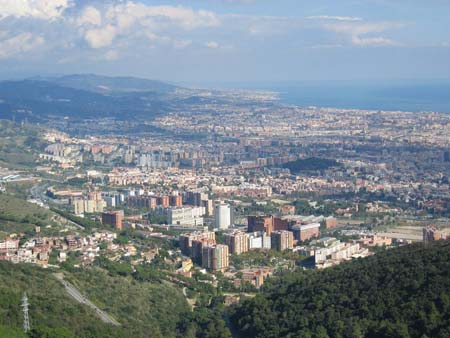• Barcelona
 |
|
The city of Barcelona is the capital of both Barcelona province and the autonomous region of Catalonia, in Spain. A seaport on the Mediterranean sea, Barcelona is the second largest Spanish city in population (1.6 m) and the principal industrial and commercial center of the country.
The oldest section of the city of Barcelona , formerly enclosed by walls, was built on the harbor and is extended to the Plaza de Cataluña, the focal point of the city. The streets of the old section are narrow and crooked; in the newer sections they are wide and straight, and the buildings are modern. Dominating Barcelona 's skyscape are the fantastic openwork spires of Templo Expiatorio de la Sagrada Familia (Church of the Sacred Family), a huge, unfinished cathedral notable for the elaborate patterns and undulating curves characteristic of its builder, the Catalan architect Antonio Gaudí y Cornet. Other points of major interest include the Church of San Pablo del Campo (914), the Gothic Cathedral of Santa Eulalia, a monument to Christopher Columbus, and the nearby peak Tibidabo (532 m/1745 ft). Among the many cultural institutions are the University of Barcelona (1450), the Autonomous University of Barcelona (1968), the Royal Archives of Aragón, the Archaeological Museum , the Museum of Ancient Art , the Museum of Modern Art , and the Contemporary Art Museum.
| |
 |
According to legend, Barcelona was founded as Barcino about 230 BC by the Carthaginian general Hamilcar Barca. The region became part of the Roman Empire in the 3rd century BC; it was ruled by the Visigoths in the 5th century AD, was conquered by the Moors in 713, and was captured by Charlemagne, King of the Franks, in 801. Under Frankish rule the city and the supporting region became the self-governing county of Catalonia , or Barcelona . The region was absorbed into the kingdom of Aragón in 1137. Barcelona thereafter gained in commercial and political importance as a Mediterranean trading and shipping center. Barcelona 's prosperity diminished after the kingdoms of Aragón and Castile united in 1479 and subsequently imposed restrictive trade policies on the city. In 1833 Barcelona Province was established, with Barcelona as the provincial capital. In the 19th and 20th centuries Barcelona was a center of Catalan regionalism, anarchy, and industrial unrest. During the Spanish Civil War (1936-1939) the city was the seat of the autonomous Catalan government and was a Loyalist stronghold. It was heavily bombed in 1938 by the insurgents, or Nationalists, who finally captured the city on January 26, 1939. Barcelona hosted the 1992 Summer Olympics which sparked a massive municipal redevelopment program.
|
• Venue - Hotels
The Champions' Cup will be held at the Hotel Majestic,
which is a truly luxurious hotel. The excellence
of the Majestic are the location, tradition and gourmet cuisine of this
impressive hotel. Located on the Paseo de Gracia, the Majestic not only
finds itself on one of Barcelona's most beautiful avenues lined with leading
international designer boutiques but, more importantly, close to some
of Antonio Gaudi's more famous legacies such as the 'Casa Battlo'
and incomparable 'Pedrera'.
Accommodation is also available
in hotels nearby. Facilities of all categories from 2 and 3 stars to 4 and 5 is offered to players coming to the Championships. In particular 3 more hotels have been negotiated, Hotel Condes de Barcelona, Hotel Prestige and Hotel NH Calderon.
• For information on accommodation in the Majestic click here.
• For information and reservations on the other hotels click here.
• Click here for a map of all four hotels. |

